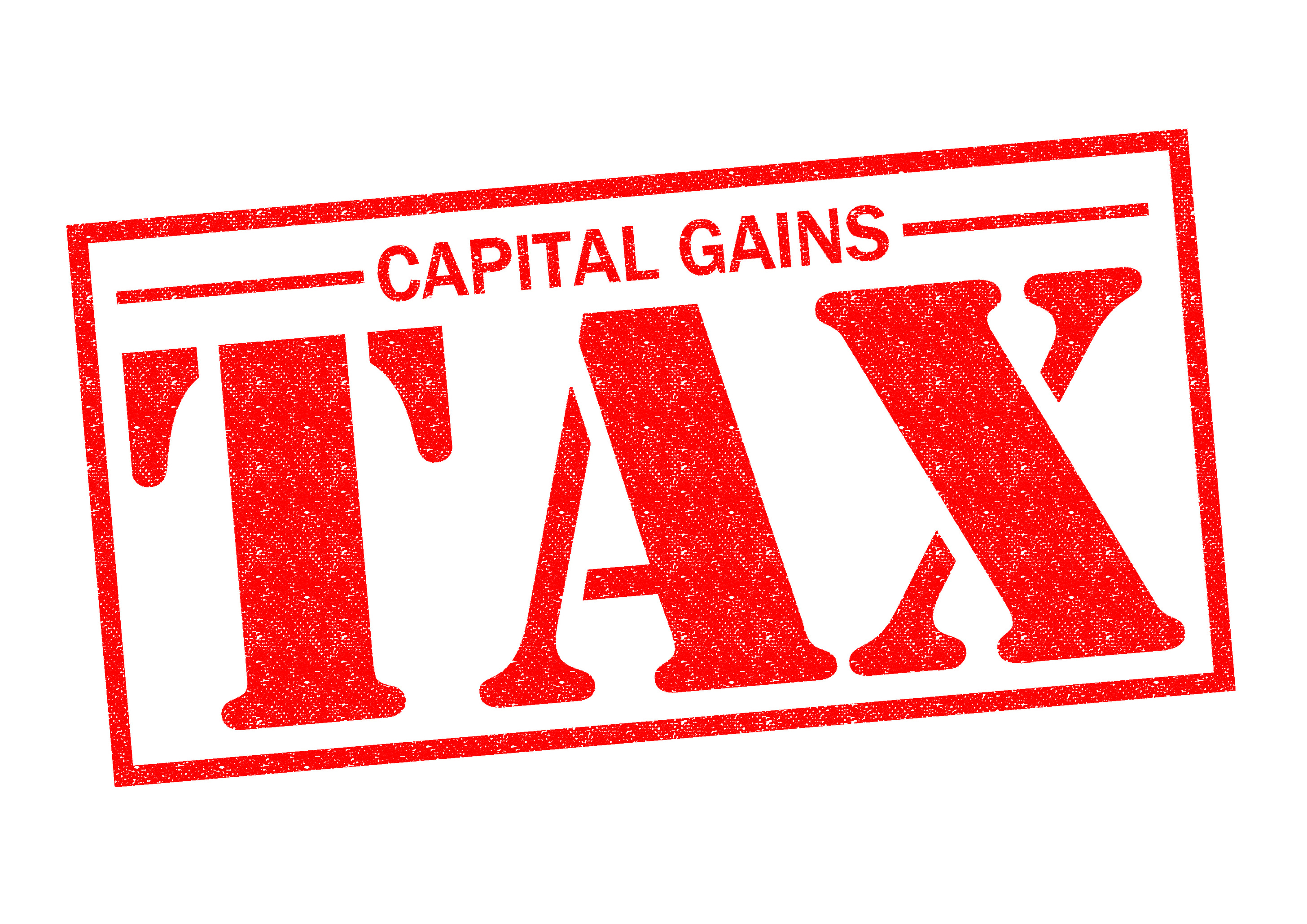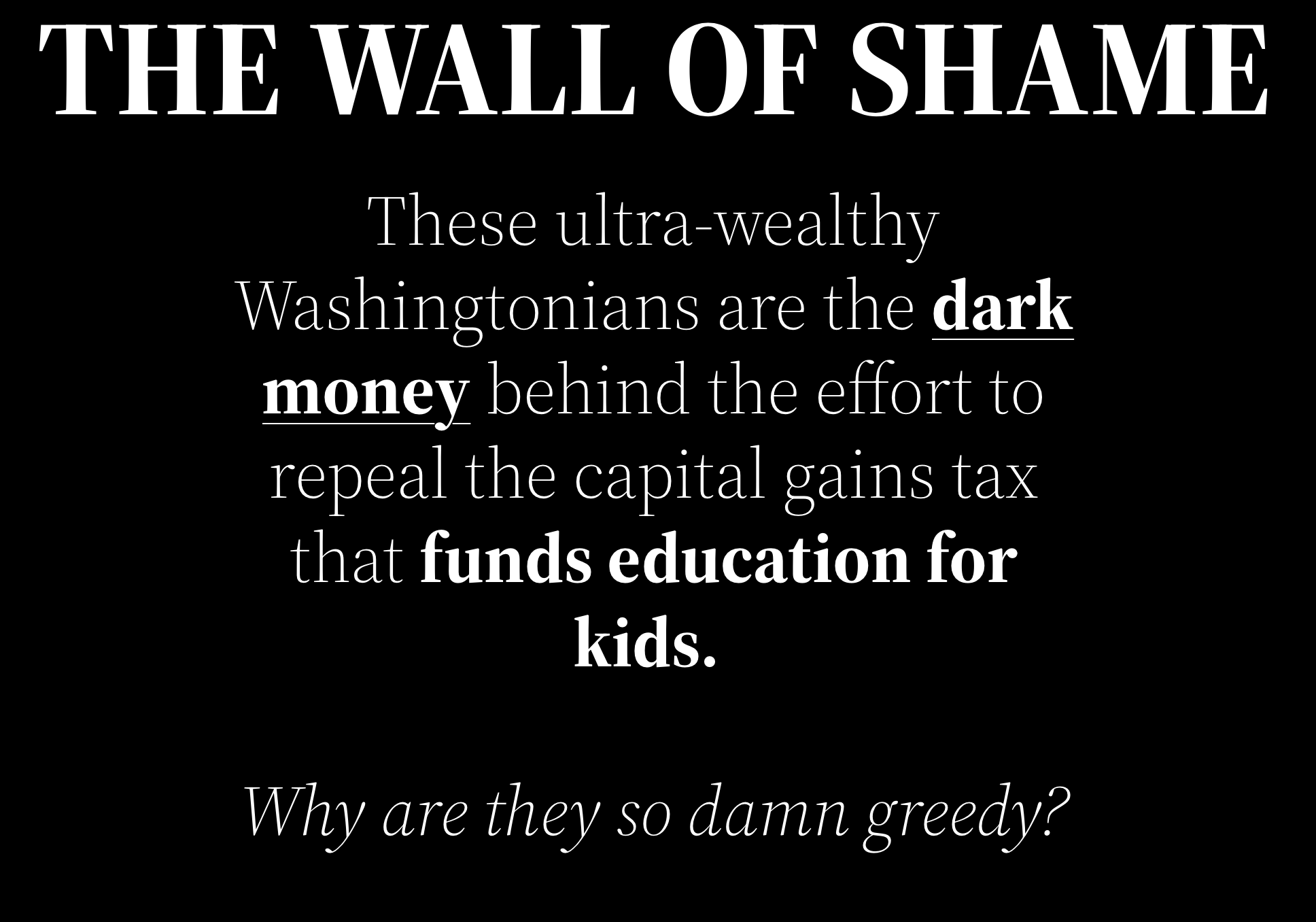Looks like we’re going to have that ballot-measure throwdown over the capital gains tax after all. Without fanfare, Repeal the Capital Gains Income Tax, a committee thus far fueled by a handful of wealthy conservatives, filed an initiative to repeal the tax late Monday afternoon. The tax has already been declared unconstitutional by a lower court.
The initiative was filed by J. Vander Stoep, a Republican political consultant and lobbyist who chairs the committee, which has been quietly paying a roster of hired-gun consultants for months now. Its nature and timing allow us to dig into the complex political dynamics of this issue, which we know y’all enjoy.
A narrow approach
First of all, it’s just a straight-up repeal, meaning that it would scrub Washington law of all mention of Senate Bill 5096 from last year, eliminating the 7 percent tax on most capital gains over $250,000, which is expected to bring in about $500 million per year when it’s fully implemented.¹
That’s interesting because it only bails out the relatively small number of wealthy people who would pay the tax, without installing some broader prohibition of an income tax to appeal to the many voters who enjoy the fact that Washington doesn’t have one of those.²
That’s likely a tactical legal decision by the committee designed to protect the initiative from a court challenge if it passes. Focusing the initiative narrowly guards against challenges under the single-subject rule, which was successfully used a few years ago to invalidate a decades-old law banning local income taxes.
It’s also an indication of confidence that they don’t need to get cute to win. The last time the issue of taxing the wealthy was before the voters of Washington, in the form of the income tax on high earners envisioned in Initiative 1098 a dozen years ago, it went down in flames.³ More recently, voters overwhelmingly gave the capital gains tax the thumbs-down in the non-binding advisory vote that was on the November ballot.⁴

But…
It allows the defenders of the tax to go all-out on the Robin Hood messaging, which they’ve already started with their Wall of Shame campaign against the rich folks backing the initiative.

The defenders point to multiple polls indicating that taxing the very rich is popular.⁵
The committee also likely has another problem in the form of a new requirement that the impact of a ballot measure on government services actually appear on the ballot. House Bill 1876, sponsored by Rep. Mia Gregerson, D-SeaTac, is currently sitting on Gov. Jay Inslee’s desk, but it seems unlikely that he won’t sign it.
Assuming he does sign it, that means the ballot will include language along the lines of: “This initiative would decrease funding for child care and schools.”
That’s never happened in Washington’s long history of anti-tax ballot initiatives, which have always offered voters the opportunity to lower their taxes without directly confronting the impact.⁶
A cloudy legal picture
This initiative campaign is also almost certainly going to happen in a weird legal limbo, because the tax has been ruled unconstitutional, at least for now. Superior Court Judge Brian Huber out in Douglas County tossed it out in late February, rejecting the state’s argument that it’s an excise tax on a transaction as opposed to a tax on income.
The state’s going to appeal, and the whole thing winds up in front of the Washington Supreme Court, but that’s going to take a while. Once Huber issues his formal order, the state has 30 days to appeal. But even if the case bypasses the Court of Appeals and goes direct to the Supremes, they work in their own sweet time. We shouldn’t expect a ruling this year, which will surely irk a lot of people wondering whether to pull the trigger on that big deal.
Where’s the money going to come from?
Just getting on the ballot could cost as much as $3 million⁷ because the pandemic and a robust initiative year in California are driving up the cost of signature gathering. Qualifying for November’s election will require 324,516 signatures from registered voters by July 8. The committee had raised less than $50,000 as of the end of February and was $100K in the hole to the aforementioned hired guns. (This presumably temporary lack of cash prompted us to rashly speculate that the campaign wouldn’t happen.) Somebody’s going to have to start writing big checks soon; those folks like to get paid.
The campaign itself could wind up costing $20 million or more. While thousands of people have millions of reasons to want this tax gone, very few would pay enough taxes to realize a positive return on investment on a five- or six-figure campaign contribution. The next round of filings to the Public Disclosure Commission, due April 11, should make for interesting reading.
The small number of donors we know about are prominent conservatives who oppose the tax on principle and aren’t shy about rumbling in the political arena; many other potential supporters might be leery of the public-relations downside of such a campaign. In theory, big companies that compensate their executives and other employees with big grants of stock should want this to go away, but that doesn’t mean they want to be on the list of fat cats taking money away from child care and education, or crosswise with Inslee and the Democrats who currently control the Legislature. We’re told, for example, that Amazon won’t be playing.⁸
Defenders of the tax have fat cats of their own
One of the reasons that the Legislature found the votes to pass the tax in the first place was the advocacy of the millionaires and billionaires whose money fuels the Democratic Party of Washington. For example, the massive increases in state support for child care and early learning that the tax is supposed to pay for were a labor of love for Lisa Mennet, the party’s single largest donor. Hard to imagine she’s not there to defend it.
Likewise, you can expect aggressive spending from the public-sector unions that supported the tax, including the Washington Education Association and SEIU 775, which currently has nearly $4 million sitting in its ballot-initiative-focused PAC.
A boon for Republicans?
With inflation, homelessness, war, and $5-a-gallon gas, this November figures to be rough on the party in power up and down the ballot. The political operatives working to chip away at the Democrat majorities won’t mind layering a big campaign that’s kinda-sorta about an income tax on top of that. But the fundraisers have to be a little nervous that the initiative will siphon money away from candidates and PACs that support them.
1 The first year of revenue is expected to be less because of wealth management decisions made last year, including Microsoft CEO Satya Nadella’s decision to dump a big chunk of his stake in the company.
2 Several initiatives that would impose a broad ban on income taxes have been filed, but there’s no indication any of them have the backing to make the ballot.
3 The Observer knows some operatives on the losing side of that fight, and they’ll tell you that voters didn’t believe the tax would remain limited to the rich. Expect to hear that line of argument this year.
4 And yes, the Tim Eyman-induced advisory votes are a flawed process designed to amplify antipathy for taxes, but 61-39 is a country ass-kicking even with a head start.
5 We’re dubious about these polls because similar research didn’t hold up 12 years ago on Initiative 1098, and various pollsters have been repeatedly wrong about the depth of voters’ antipathy for taxes.
6 A fiscal impact statement prepared by the Office of Financial Management is required in the voters’ pamphlet, but it doesn’t appear on the actual ballot.
7 I pegged this number at about $1 million in a recent edition of the Observer, prompting several folks who work in this area to chime in about the rising costs of direct democracy.
8 Amazon didn’t throw in against the high earners’ income tax a dozen years ago, although Jeff Bezos did as an individual. The biggest donor to that “no” campaign was Steve Ballmer, then CEO of Microsoft. Today, the Ballmer Group is among the state’s largest philanthropists, advocating for, among other things, more support for child care and early learning.
Your support matters.
Public service journalism is important today as ever. If you get something from our coverage, please consider making a donation to support our work. Thanks for reading our stuff.




